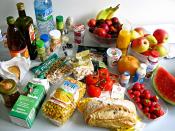Food addiction, otherwise known as compulsive eating, is a physical and psychological addiction that ensnares the body and the mind. The addiction to food is often not considered to be dangerous. On the contrary, it is dangerous to the body and the mind. The psychological aspects are not as clear as the physical for obvious reasons, although they are just as dangerous.
Food addiction is similar to drug and alcohol addiction. It produces cravings that, gradually, become unbearable. The addict's body suffers from withdrawal, just as it would from cocaine or cigarettes, if attempting to cut down on the foods that trigger cravings. Refined sugar, flour, and fats become what alcohol is to the alcoholic, or cocaine is to the cocaine addict. The body will have an increased desire for it the more the person indulges himself. Food sensitivities, or allergies, are often responsible for the addict's symptoms.
This common condition is often overlooked when treating a food addict. Food allergies also become difficult to treat in the addict because the addiction is stronger than the adverse effects of the allergies.
Food addiction is more a psychological addiction than anything else. Winn says that "the essence of any serious addiction is a pursuit of pleasure"(523). One of the main symptoms of a food addict is the obsession with a remembered sense of pleasure or comfort with food when he is not eating. Repeated use of the same foods can create a profound lack of self-control. The addict no longer can control what he eats. Food consumes his livelihood. Whether at work or hanging out with friends, all he can think about is what he is going to eat next. Food becomes a way of life for some addicts. The mind becomes preoccupied with finding sources of food that...



Short but well written
The content of this essay is well written and well explained. It has many good points and it takes from established theories. I would have liked to see a complete bibliography.
0 out of 0 people found this comment useful.